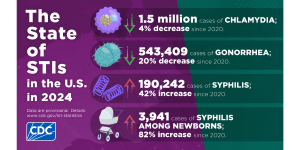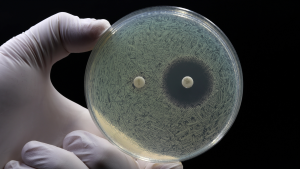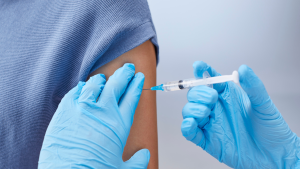
Latest Data Shows that Chlamydia, Gonorrhea, and Syphilis Rates are Dropping
The CDC just released STI Surveillance Data for 2024 that show cases of chlamydia, gonorrhea, and syphilis are slowly declining.

The Centers for Disease Control and Prevention (CDC) just released guidelines for the use of doxy PEP. Doxy PEP—or doxycycline post-exposure prophylaxis—is a strategy to prevent bacterial STIs. As expected, the guidelines are limited to gay, bisexual, and other men who have sex with men (MSM) and transgender women (TGW). This is because this is the population that saw success in clinical trials.
Doxy PEP involves taking an oral antibiotic after condomless sex to prevent bacterial STIs. Research has shown that this can reduce the possibility of contracting chlamydia by 88%, syphilis by 87%, and gonorrhea by 55%.
The new guidelines say that providers should counsel specific patients about doxy PEP. These include MSM and TGW who have had a bacterial STI in the last 12 months. Providers should discuss the benefits and harms of using doxy PEP to prevent new infection with this group.
CDC recommends that providers offer people in this population prescriptions for doxy PEP. Individuals are advised to take 200 mg of doxycycline within 72 hours after having oral, vaginal, or anal sex. Patients can continue to take doxy PEP whenever they have sex, but should be told not to exceed 200 mg every 24 hours.
The CDC suggests that doxy PEP be part of comprehensive sexual health approach. This should also include:
The guidance states that patients should be tested for bacterial STIs upon receiving a prescription for doxy PEP. Additionally, they should continue to be tested every 3-6 months moving forward. Tests may look for genital, oral, or anal infection depending on each person’s potential exposure.
Patients and providers can together reassess the ongoing need for doxy PEP every 3-6 months.
Again, these recommendations only apply to MSM and TGW who have had a bacterial STI in the last 12 months. This is the population for which there is strong research. The guidelines do say that providers might also want to discuss doxy PEP with MSM and TGW who have not had a bacterial STI diagnosed during the previous year, but will be participating in sexual activities that are known to increase the likelihood of exposure to STIs.
For now, the CDC is offering no recommendations on the use of doxy PEP for cisgender women, cisgender heterosexual men, transgender men, and other queer and nonbinary persons because there is not enough research. That said, the agency acknowledges this strategy could be effective in any or all of these populations.
While we wait for research to confirm this, the CDC suggests that providers “…use their clinical judgement and shared decision-making to inform use of doxy PEP with populations that are not part of CDC recommendations.”
Doxy PEP is an exciting new strategy that comes at a time when bacterial STIs are on the rise. There were 2.5 million cases of chlamydia, gonorrhea, and syphilis reported in the U.S. in 2022. Cases of chlamydia and gonorrhea—the two most common reportable STIs—have remained high for many years. Syphilis cases have also skyrocketed recently. The number of primary and secondary syphilis infections in 2022 was 80% higher than in 2018. Hopefully, these guidelines will encourage providers to talk to their eligible patients and lead to more widespread use of doxy PEP.

The CDC just released STI Surveillance Data for 2024 that show cases of chlamydia, gonorrhea, and syphilis are slowly declining.

A new study is raising concerns that doxy PEP, a strategy of taking medication to prevent STIs, might already be contributing to the rise of antibiotic-resistant bacteria.

On a recent episode of Love Island, a cast member sugested that we could blame our current STI epidemic on men who had sex with animals. She pointed to koalas with chlamydia as an example. There’s some truth here, but also a lot of misinformation.

There’s potential good news in gonorrhea prevention as a series of studies suggests that certain meningococcal B (MenB) vaccines can reduce the risk of gonorrhea.

Many people who take doxy PEP say it gives them peace of mind in their relationships and sex life. We sat down with Oscar Alexis, Efthimios, and Maxfield Haynes to talk about doxy PEP and get their perspective.

About 1.6 million cases of chlamydia and 600,000 cases of gonorrhea are diagnosed in the United Sates each year. A new study suggests that these patients may not be following through with STI treatment or getting the right antibiotics.
ASHA believes that all people have the right to the information and services that will help them to have optimum sexual health. We envision a time when stigma is no longer associated with sexual health and our nation is united in its belief that sexuality is a normal, healthy, and positive aspect of human life.
ABOUT
GET INVOLVED
ASHA WEBSITES
GET HELP
© 2026 American Sexual Health Association
We need to know if we can keep you company during this visit. We are useful for making this site work.
We use cookies to enhance your browsing experience. You can choose which cookies you want to accept.
Necessary cookies help make a website usable by enabling basic functions like page navigation and access to secure areas. The website cannot function properly without these cookies.
| Cookie | Provider | Purpose | Expiry |
|---|---|---|---|
digiconsent | This website | Stores your cookie consent preferences. | 1 year |
wordpress_logged_in_* | WordPress | Identifies logged-in users and their authentication details. | 14 days / Session |
wordpress_sec_* | WordPress | Stores authentication details for secure areas. | 14 days / Session |
wp-settings-* | WordPress | Stores user interface customization preferences. | 1 year |
wp-settings-time-* | WordPress | Stores the time when wp-settings cookie was set. | 1 year |
Analytics cookies help us understand how visitors interact with our website by collecting and reporting information anonymously. This helps us improve our website.
Marketing cookies are used to track visitors across websites. The intention is to display ads that are relevant and engaging for the individual user.
Functional cookies enable the website to provide enhanced functionality and personalization. They may be set by us or by third party providers.